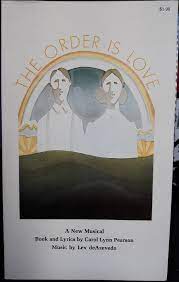Articles/Essays – Volume 06, No. 2
Lyrics and Love in Orderville | Carol Lynn Pearson and Lex de Azevedo, The Orders is Love
To write a musical play based on any church theme or motivate will inevitably invite comparison with the “Father of Us All,” Promised Valley, written by Arnold Sundgard (lyrics) and Crawford Gates (music).
Promised Valley is the most successful musical in the history of the church in terms of popular acclaim and financial gain. Its popularity has been largely due to the memorable, tuneful music interwoven into the story. People come away from performances singing the tunes or wanting to buy the music. Though the story and lyrics were written by a Broadway professional, Promised Valley suffers from a weak plot, its story erratic and often contrived. The story is even worse in the condensed version currently presented to tourists in Salt Lake City. The music, however, deservedly lives on.
The Order Is Love, by a full Mormon team (story, lyrics and music) has reversed this situation in rather a nice way. Here the plot and dramatic situation dominate the show, with real characters and real situations devel oping believably. One goes away from the production feeling that Orderville, upon which the musical play is based, indeed must have been much like this, or at least hoping that it was. Some of the funniest lines in all of Mormondom appear in this musical, a tribute to the sensitive wit of Carol Lynn Pearson.
The music is lively, impressive, and highly rhythmic, but the qualities that beg for comparison to Promised Valley are in short supply. The music is fun and exciting, but there is difference between adequate melodies that merely satisfy and tunes which last beyond a single performance. There were a few of the latter in The Order Is Love. One tune, “We’re Brothers,” might be an exception, because of the clever counterpoint and the charm of the young men who sang it.
When this production gets trimmed down for stake and ward use, young people will probably enjoy dancing to and singing the music. The production numbers generally have zip and vigor, accorded by rock beats and Latin rhythms. The work has a “today” flavor, with plenty of appeal to the youth of the Church. But today’s sounds become yesterday’s sounds very quickly, and a work which seems fresh and alive at its inception becomes dated and old in less than a dozen years.
The orchestration is expertly done by Lex de Azevedo. Considering that most composers of musicals have other professionals score their show music, this is quite a feat for this talented young man. Many of the dances and group pieces may have to be simplified from their present rhythmic complexity for ward and stake musicians, but young casts will have rollicking fun learning the dances and music, all of which really “swings.”
Much of the music could be retitled “The King Family Show Revisited,” which, considering the composer’s background as arranger for the King Family Show (Lex is the son of Alice, one of the King Sisters), is only natural. The music contains all the elements found in a TV variety show, which tends to entertain but does little to unify a more complex vehicle such as a musical play. One thinks of the best songs as being the right combination of notes and words, in the right place and at the right time, but the songs from The Order Is Love could fit any number of situations. The musical style lacks the unity of the story and lyrics. A Latin-American nightclub style (a la Las Vegas), tends to take the viewer’s mind farther south than Southern Utah.
The B.Y.U. production featured an excellent orchestra, rather precisely directed by Newell Dayley. Lead singers tended to be weak, but the choral singing was well-rehearsed and effective, as were the dancers and actors.
The marvelous thing to contemplate is that B.Y.U. has the facilities, the interest, the talent, and the money to finance this kind of venture. This should spur the kind of writing needed to provide more such quality musicals for Church use. Much was learned from the evening “in Orderville,” more than many history lessons about the operation of the United Order there could have taught. May this be the beginning of better things to come.
A review of the music of The Order is Love, a musical play by Carol Lynn Pearson, with music by Lex de Azevedo.


 Back to full Issue
Back to full Issue

